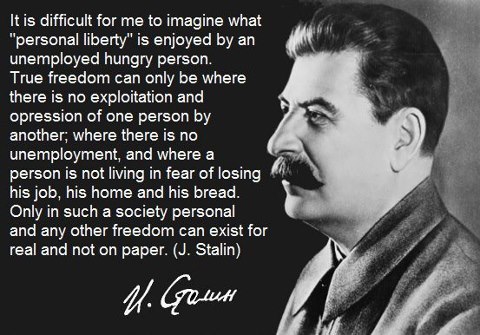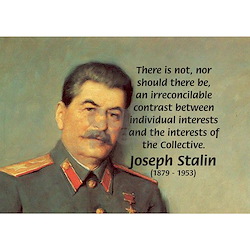nazz
Doubting Thomas
Perhaps not so new but new to me.
Generally speaking socialism is usually contrasted with capitalism, that is to say it is defined primarily as an economic philosophy. While there is some truth to this it is not how or why the word was originally coined. When the term socialism came into use it was really being contrasted with individualism and not really in reference to a particular economic philosophy per se. The term that is most closely associated with an individualist political philosophy today is libertarianism. What is odd about that is that the term libertarian was first used by some socialists in self reference to themselves and this use persists today outside of the United States.
We can define libertarianism like this: A philosophy which holds that the rights of the individual are more important than the general welfare of a society as a whole.
In contrast we could define socialism as the reverse of that: A philosophy which holds that general welfare of a society as a whole is more important than the rights of the individual.
In a purely libertarian system the rights of the individual are unlimited and unrestricted other than when they conflict with the rights of other individuals (often expressed as "my rights end where yours begin"). If the protection and exercise of these rights results in negative social conditions these are accepted as unfortunate but necessary. While some libertarians are anarchists others see a need for a state whose only function is the protection of individual liberties (minarchism). Libertarianism in the economic sphere basically means laissez-faire capitalism. This is the basic position of the Libertarian Party in the USA.
In contrast to this in a purely socialistic society the rights of individuals are limited and restricted on the basis of how they affect the general welfare of a society taken as a whole. That is to say there are no inherent individual rights but individuals may be granted such rights as long as they are not seen as detrimental to the society. In the economic sphere this means that individuals cannot do whatever they please. They are not permitted to engage in economic activities that in any way harm their society.
When socialism is viewed in this way it is easier to understand how something like National Socialism, or more generally speaking fascism, can be viewed as truly socialistic. In a fascist society the rights of individuals are secondary to the welfare of the society as embodied in the State. The well being of the State as a whole becomes paramount. Capitalism was allowed and tolerated only as far as it served the interests of the State.
In totalitarian Marxists states we see a similar trend even if the stated goals and strategies are different. For Marxists the goal is the emancipation of the working class (seen as constituting the "society as a whole"). The State is a necessary evil used to accomplish that goal. Individual political and economic rights are suppressed in the effort to achieve that goal. The welfare of society--the working class as a whole--becomes paramount.
Where am I going with all of this? I have in the past defined myself as a libertarian socialist. Based on what I have written above that might seem as oxymoronic as a square circle. More recently I've been using the term "left libertarian", a term which may also be somewhat problematic. Right now I am thinking the term "social libertarian" might be the most appropriate. With each of these self-designations what I am really trying to express is my belief that neither a purely libertarian and a purely socialistic society is the ideal but rather that some balance between the two is the best. A purely libertarian system results in social inequalities and economic disparities I find unacceptable. A purely socialistic system results in unacceptable curtailment of civil and economic liberties. But if push comes to shove I am going to err on the side of the protection of individual rights so it makes sense that I use a term that modifies "libertarian" rather than vice versa. "Social libertarian" seems to fit that bill and also stresses that my main focus is on individual rights in the social rather than economic sphere. I favor a more socialistic approach when it comes to economics. And social libertarian can also be contrasted with "anti-social libertarian" which I think would be a good descriptor for the positions of the Libertarian Party in the USA.
Generally speaking socialism is usually contrasted with capitalism, that is to say it is defined primarily as an economic philosophy. While there is some truth to this it is not how or why the word was originally coined. When the term socialism came into use it was really being contrasted with individualism and not really in reference to a particular economic philosophy per se. The term that is most closely associated with an individualist political philosophy today is libertarianism. What is odd about that is that the term libertarian was first used by some socialists in self reference to themselves and this use persists today outside of the United States.
We can define libertarianism like this: A philosophy which holds that the rights of the individual are more important than the general welfare of a society as a whole.
In contrast we could define socialism as the reverse of that: A philosophy which holds that general welfare of a society as a whole is more important than the rights of the individual.
In a purely libertarian system the rights of the individual are unlimited and unrestricted other than when they conflict with the rights of other individuals (often expressed as "my rights end where yours begin"). If the protection and exercise of these rights results in negative social conditions these are accepted as unfortunate but necessary. While some libertarians are anarchists others see a need for a state whose only function is the protection of individual liberties (minarchism). Libertarianism in the economic sphere basically means laissez-faire capitalism. This is the basic position of the Libertarian Party in the USA.
In contrast to this in a purely socialistic society the rights of individuals are limited and restricted on the basis of how they affect the general welfare of a society taken as a whole. That is to say there are no inherent individual rights but individuals may be granted such rights as long as they are not seen as detrimental to the society. In the economic sphere this means that individuals cannot do whatever they please. They are not permitted to engage in economic activities that in any way harm their society.
When socialism is viewed in this way it is easier to understand how something like National Socialism, or more generally speaking fascism, can be viewed as truly socialistic. In a fascist society the rights of individuals are secondary to the welfare of the society as embodied in the State. The well being of the State as a whole becomes paramount. Capitalism was allowed and tolerated only as far as it served the interests of the State.
In totalitarian Marxists states we see a similar trend even if the stated goals and strategies are different. For Marxists the goal is the emancipation of the working class (seen as constituting the "society as a whole"). The State is a necessary evil used to accomplish that goal. Individual political and economic rights are suppressed in the effort to achieve that goal. The welfare of society--the working class as a whole--becomes paramount.
Where am I going with all of this? I have in the past defined myself as a libertarian socialist. Based on what I have written above that might seem as oxymoronic as a square circle. More recently I've been using the term "left libertarian", a term which may also be somewhat problematic. Right now I am thinking the term "social libertarian" might be the most appropriate. With each of these self-designations what I am really trying to express is my belief that neither a purely libertarian and a purely socialistic society is the ideal but rather that some balance between the two is the best. A purely libertarian system results in social inequalities and economic disparities I find unacceptable. A purely socialistic system results in unacceptable curtailment of civil and economic liberties. But if push comes to shove I am going to err on the side of the protection of individual rights so it makes sense that I use a term that modifies "libertarian" rather than vice versa. "Social libertarian" seems to fit that bill and also stresses that my main focus is on individual rights in the social rather than economic sphere. I favor a more socialistic approach when it comes to economics. And social libertarian can also be contrasted with "anti-social libertarian" which I think would be a good descriptor for the positions of the Libertarian Party in the USA.
Last edited:


